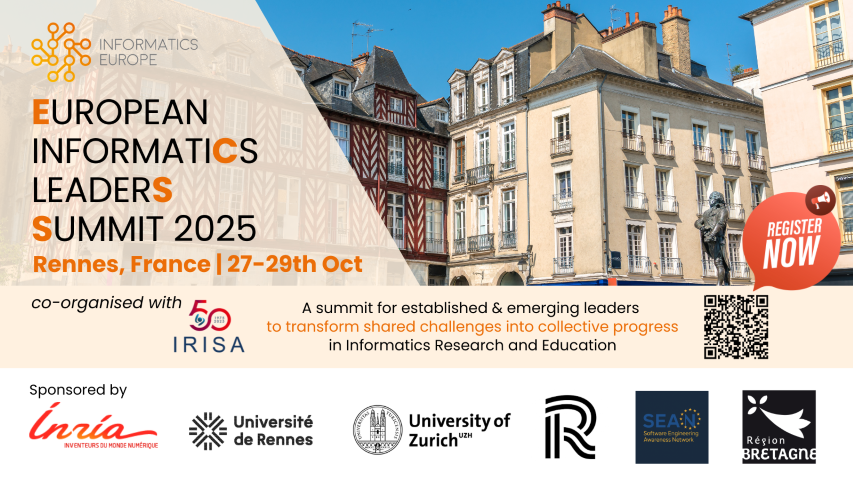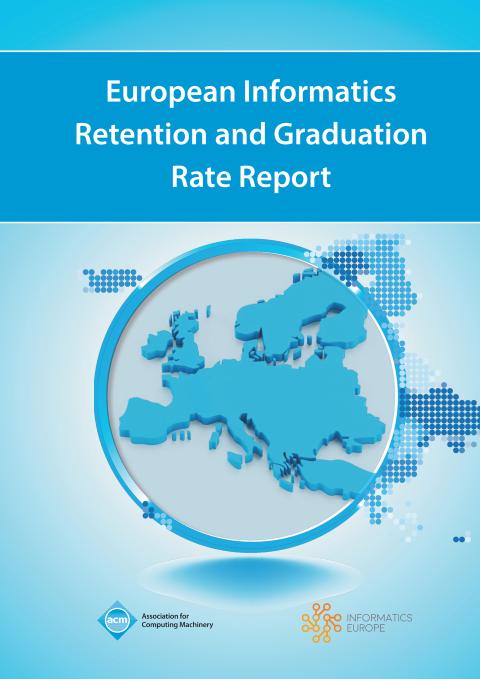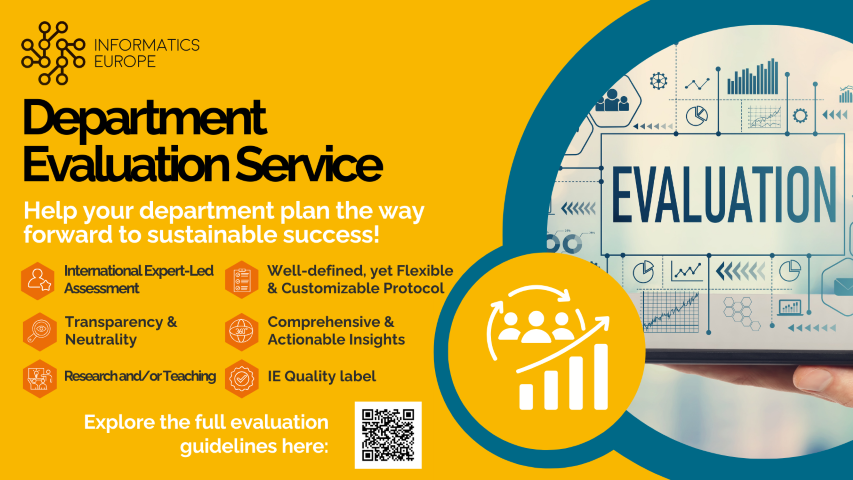|
Fresh insights, event updates and community highlights — explore what’s new in Informatics Europe (IE) and help spread the word across the wider Informatics community!
In this issue:
ECSS 2025: early bird extended
Don’t miss the Early Bird registration offer for ECSS 2025, now extended to 22 September, 23:59 CEST.
The ECSS programme now includes updated details on workshops such as Open Science and Ethics, adding timely perspectives to three days of high-level dialogue, inspiring talks, and hands-on sessions. Explore the full programme here.
Co-hosted with IRISA for its 50th anniversary, ECSS 2025 remains Europe’s only summit dedicated to the strategic and managerial dimensions of Informatics research and education. It offers leaders a unique opportunity to exchange ideas and policy perspectives, strengthen institutional strategies, and transform shared challenges into collective progress for both their institutions and the European Informatics community at large.
ECSS also supports the next generation of leaders through its Professional Workshop for Early Career Researchers. Since 2021, the Workshop continues to offer practical guidance on career development and includes a PhD Symposium, where participants can present posters and receive feedback from senior colleagues. Poster submissions are open until 22 September.
Hear directly from past ECSS participants why they return year after year — watch here.

Register now: https://www.informatics-europe.org/ecss/registration.html
Reports on Informatics HE in Europe with student retention & graduation analysis

Informatics Europe and ACM Europe have published the “European Informatics Retention and Graduation Rate Report”, the first pan-European analysis of student retention and graduation in bachelor-level Informatics programmes. Covering 2010–2023 with data from 13 countries via the IE Higher Education (IEHE) Data Portal, the report compares research universities and universities of applied sciences, examines gender-related patterns, and highlights both shared trends and national differences across Europe.
In addition, IE has released a new report, “Bachelor-Level Informatics Education in Europe: Key Data & Trends, 2018/19–2022/23”, based on validated statistics from 24 European countries across five academic years (2018/19–2022/23). This report tracks bachelor’s enrolments, graduation rates, gender distribution, and the role of different types of higher education institutions. A report including the trends at the Master’s and PhD levels will follow in 2026.
Key findings of this year’s analysis include: rising enrolment trends in most countries, not always followed by increasing bachelor's degrees awarded, particularly among women; persistent underrepresentation of women; major role of universities of applied sciences in several Informatics education systems.
Both reports were developed under the guidance of the IE Data Analysis & Reporting Working Group and evidence the ongoing need for data collection, gender equity efforts, and policy support to strengthen Informatics education across Europe. Members and colleagues are invited to contribute to the IEHE Data Portal and the Working Group, helping expand coverage and support future analyses. Find out how here.
Recent publications on Informatics Education, Gender Diversity & Digital Humanism
IE and its community continue to shape the agenda on education, diversity, and the societal role of Informatics. Three recent publications from our pan-European collaborations and by key partners showcase this impact and the value of our collective efforts and continued dialogue.
-
Actions for Gender Balance in Informatics Across Europe
This handbook, the final deliverable of COST Action EUGAIN (2020–2024), compiles concrete recommendations to advance gender balance in Informatics. Coordinated by IE as Action’s Grant Holder Manager, this publication serves as a practical resource for institutions and decision-makers working to strengthen diversity in Informatics education and research.
-
A European Survey on Requirements for the Informatics School Curriculum and Informatics School Teachers’ Education
Carried out under the Informatics for All (I4All) coalition, a recent report presents findings from a 28-country survey on school-level Informatics education. It highlights a broad consensus on recognising Informatics as an autonomous subject, integrating contemporary topics such as AI and data science, and ensuring specialised teacher training — providing valuable evidence for policymakers and supporting more coherent Informatics education policies across Europe.
-
Teaching and Learning AI in K-12 Informatics Education
This is a paper co-authored by several members of the IE Education Research Working Group, who have acknowledged the Group for laying its foundation. This is a great example of how collaboration within IE Working Groups generates research with international reach and practical relevance, beyond the explicit working group’s outcomes.
-
Digital Humanism on Digitalization and Artificial Intelligence
Authored by Hannes Werthner, a key figure behind the Digital Humanism Initiative, this book explores the relationship between humans, technology, and society, offering an accessible framework for using Informatics responsibly and sustainably in line with human rights and the UN’s SDGs. IE collaborates with TU Wien and other partners on the Digital Humanism initiative, promoting a global dialogue on how technology both shapes and is shaped by human values.
These publications exemplify how our community is driving progress in education, diversity, and the broader dialogue on Informatics and society. They also reaffirm the value of Informatics Europe as a platform for collaboration and advocacy — helping ideas grow into initiatives with tangible European impact. If you are considering a new project or partnership, get in touch with us to see how we can connect you with the right people and strengthen your proposal.
2 NEW IE Working Groups for Early Career Support & Software Research: join & contribute!
IE Working Groups (WGs) bring members together to exchange ideas, build networks, and deliver outcomes that benefit the wider community. Two new WGs have just been launched by the IE community:
-
Early Career Researchers (ECR) WG: Building on the momentum of the ECSS Professional Workshop for Early Career Researchers into a year-round effort. Chaired by Prof. Dimka Karastoyanova (University of Groningen) and Prof. Elisabetta Di Nitto (Politecnico di Milano), the new WG offers early career researchers support, mentorship, and visibility, while giving senior academics the chance to guide, inspire and shape development structures for the next generation.
-
Software Research WG: In coalition with 12 national informatics and software research associations across nine European countries, this group seeks to enhance collaboration across Europe aiming at increasing the visibility and impact of software research on the agendas of both European and national funding bodies. Chaired by Prof. Tanja Vos (Universitat Politécnica de Valencia), the WG invites colleagues interested in this vital cause to join its workshop in Rennes, co-located with ECSS (further details to be announced on the WG’s webpage).
Join these and the other six IE Working Groups to share perspectives, elevate discussions to the European level, and contribute meaningful outcomes for our community. Proposals for new Groups are also welcome (conditions online).
Open IE activities
Stay connected with IE initiatives, designed for individual, institutional and community impact.
This month, we bring your attention to the IE Job Platform, exclusively dedicated to Informatics research and higher education job openings. Enhance your recruiting by advertising your open scientific positions with ease across Europe. Posting is complimentary for IE members, while the search is open to all.
Also consider the Department Evaluation Service, an expert-led assessment based on a peer-developed and extensively tested protocol, yet adaptable to your institution’s specific context and needs. It delivers comprehensive, actionable feedback to support sustainable strategic development. A complement to any national accreditation process.

New IE members
We are pleased to welcome the following new academic members:
They joined a growing IE membership of nearly 200 informatics institutions, national associations, companies and research centres from over 30 countries. Check out our current members list.
Events by IE members
IE member news
Computer Science at UCLouvain: a programme in transition – UCLouvain, Belgium
The University’s Bachelor in Computer Science programme has been redesigned to better meet the needs of a rapidly evolving digital society. The renewed programme equips students not only with coding skills but also with the capacity to shape the technologies of tomorrow. Changes include:
- Stronger theoretical and practical foundations from year one
- New courses in AI, databases, cybersecurity, networks, and game development
- Greater focus on the societal, legal, and ethical dimensions of digital technology
The renewed programme aims to prepare computer scientists ready to tackle the challenges of a rapidly evolving digital world. Discover the full programme here.
New machine learning method offers better predictions of future disease risk – Aalto University, Finland
Researchers at Aalto University have developed survivalFM, a new machine learning method that improves the estimation of risk of developing complex diseases such as heart disease, diabetes, and liver conditions. Unlike traditional models that treat each factor separately, survivalFM captures how risk factors — such as age, lifestyle, and cholesterol — interact with each other, offering a more detailed picture of a person’s risk. Tested on data from the UK Biobank, the method outperformed standard prediction tools that treat risk factors independently, and was designed to be transparent, allowing researchers and clinicians to see which combinations of factors influence predictions. Published in Nature Communications on July 18th, the approach could advance both healthcare and other fields where timing and risk matter. Full news here.
Data Science Lab Study on AI Cooperation Featured in UN Human Development Report - Politecnico Milano, Italy
The paper “Nicer Than Humans: How do Large Language Models Behave in the Prisoner's Dilemma?”, led by research assistant Nicoló Fontana (Politecnico di Milano) in collaboration with Prof. Luca Maria Aiello from the IT University of Copenhagen, has been cited in the 2025 UN Human Development Report, “A matter of choice: People and possibilities in the age of AI”. The paper presents the research results showing that LLMs generally act at least as cooperatively as human players, displaying particularly forgiving and non-retaliatory behaviours when faced with low levels of opponent defection. Read more here.
***
Want to share your institute’s latest updates with fellow IE members and professionals in Informatics and related fields? Simply email the news to our Communication Specialist Kit Wan Chui to get featured in our Bulletin, LinkedIn and Bluesky.
|
|


